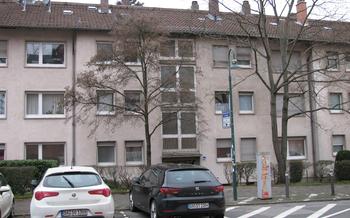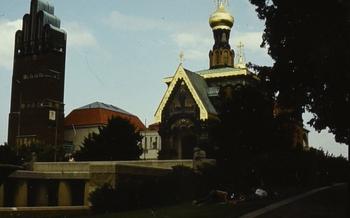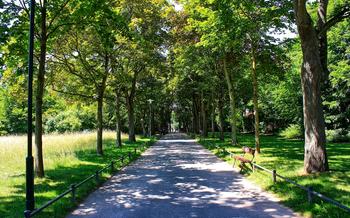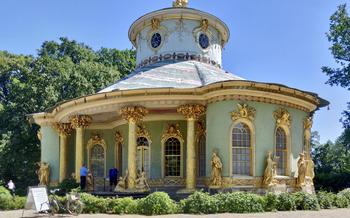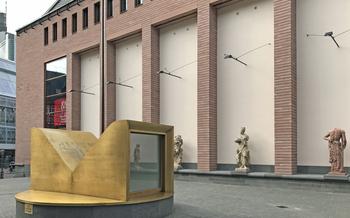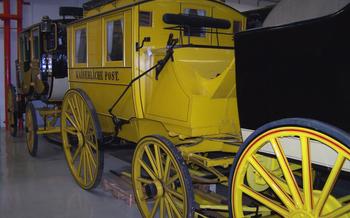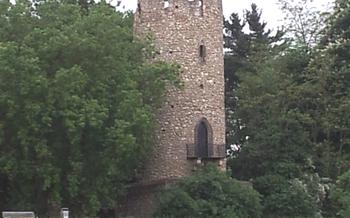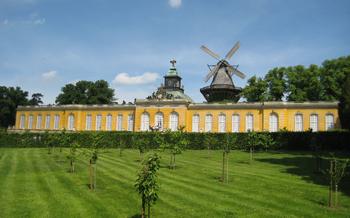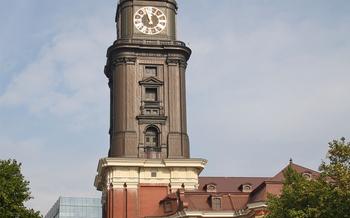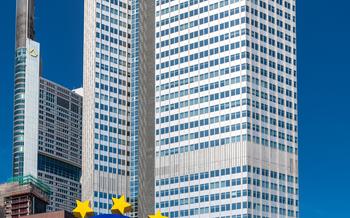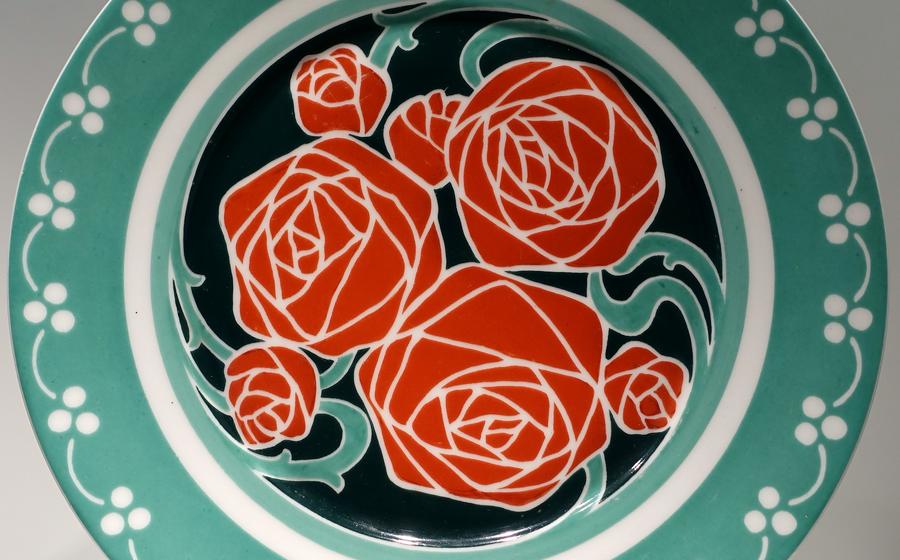
Porcelain Museum
- Historical Significance
- Location and Accessibility
- Exhibitions and Artifacts
- Education and Outreach Programs
- Guided Tours and Audio Guides
- Special Events and Exhibitions
- Museum Shop and Souvenirs
- Accessibility for Visitors with Disabilities
- Family-Friendly Activities
- Photography and Social Media
- Ticket Prices and Hours of Operation
- Nearby Attractions and Activities
- Food and Beverage Options
- Accommodations and Where to Stay
Historical Significance
The Porcelain Museum in Darmstadt, Germany, is a treasure trove of ceramic art and history. Founded in 1905, it is one of the oldest and most renowned porcelain museums in the world. The museum's collection spans centuries, showcasing the evolution of porcelain from its early origins in China to its development as a refined craft in Europe.
Darmstadt played a significant role in the history of porcelain production in Germany. In the 18th century, the city became a hub for porcelain manufacturing, thanks to the patronage of the Landgraves of Hesse-Darmstadt. The Landgraves established a porcelain factory in 1768, which produced exquisite pieces that rivaled those from the renowned Meissen manufactory. The museum's collection features many fine examples from this period, including delicate figurines, tableware, and decorative objects.
The Porcelain Museum serves as a testament to the artistry and craftsmanship that went into the creation of porcelain. Through its extensive collection, the museum preserves and showcases the rich history of this elegant material, providing visitors with a glimpse into the world of porcelain and its enduring appeal.
Location and Accessibility
The Porcelain Museum is situated in the heart of Darmstadt, a vibrant city renowned for its rich cultural heritage. It can be found at the address: Marktplatz 15, 64283 Darmstadt, Germany. The museum is conveniently accessible by various means of transportation. For those opting for public transit, the Darmstadt Hauptbahnhof (main train station) is just a short walk away, offering direct connections to regional and national rail lines. Multiple bus lines also stop nearby, providing easy access from different parts of the city. If you prefer to drive, there are several parking garages within walking distance of the museum, ensuring a hassle-free visit.
Once you arrive, you'll find yourself in a charming neighborhood surrounded by historical landmarks, inviting cafés, and boutiques. The museum's central location makes it an ideal starting point for exploring Darmstadt's many attractions, including the Darmstadt Residenzschloss (palace), the Hessisches Landesmuseum (state museum), and the Kunsthalle Darmstadt (art gallery). Whether you're a history buff, art enthusiast, or simply looking to soak up the local atmosphere, Darmstadt has something to offer every visitor.
Exhibitions and Artifacts
The Porcelain Museum houses a vast and diverse collection of porcelain artifacts, showcasing the evolution and artistry of this delicate craft. From classic pieces to contemporary creations, the museum's exhibits offer a comprehensive overview of porcelain's rich history. Themed exhibitions and displays delve into specific aspects of porcelain production, such as the influence of different regions, periods, and artists.
Featured Artists and Their Contributions:
Among the highlights of the museum's collection are works by renowned porcelain artists such as Johann Friedrich Böttger, who is credited with inventing European hard-paste porcelain, and Meissen, a German manufacturer known for its exquisite figurines and tableware. Visitors can admire the intricate details and masterful craftsmanship of these historic pieces, which have left an indelible mark on the world of porcelain art.
Must-See Pieces in the Museum's Collection:
-
Böttger's Red Porcelain: One of the most significant pieces in the museum's collection is a rare example of Böttger's early red porcelain, a pioneering achievement in European porcelain production.
-
Meissen Swan Service: This magnificent tableware set, consisting of over 2,000 pieces, is a testament to the exceptional skill and artistry of Meissen craftsmen.
-
Contemporary Installations: The museum also showcases contemporary porcelain works that push the boundaries of traditional techniques and aesthetics, offering a glimpse into the future of porcelain art.
Education and Outreach Programs
The Porcelain Museum goes beyond showcasing its exquisite collection; it actively engages the community through a variety of educational programs and outreach initiatives. Workshops, lectures, and demonstrations led by experienced artists and educators provide an immersive learning experience for visitors of all ages.
Families and school groups can benefit from educational resources and materials designed to enhance their understanding and appreciation of porcelain art. Interactive exhibits and hands-on activities encourage visitors to explore their creativity and discover the techniques behind porcelain making.
The museum's commitment to education extends beyond its walls through collaborations with local schools and institutions. Joint projects, field trips, and workshops bring the world of porcelain to students, fostering an interest in art and history from a young age. These initiatives not only enrich the museum's educational offerings but also contribute to the cultural development of the community.
Guided Tours and Audio Guides
Immerse Yourself in the World of Porcelain with Guided Tours and Audio Guides
To enhance your visit and gain deeper insights into the world of porcelain, the Porcelain Museum offers a range of guided tours and audio guide options. Experienced guides lead visitors through the museum's collection, sharing fascinating stories and anecdotes about the history, techniques, and artists associated with porcelain production. Guided tours are available in various languages, including English, German, French, and Spanish, ensuring that visitors from all over the world can enjoy a comprehensive and engaging experience.
Highlights of the guided tours include an exploration of the museum's most significant pieces, such as the exquisite Meissen figurines, the delicate Chinese porcelain, and the innovative contemporary designs. Visitors will learn about the different styles, techniques, and influences that have shaped the evolution of porcelain over the centuries.
For those who prefer a self-guided experience, audio guides are available in multiple languages. These audio guides provide insightful commentary on selected exhibits, allowing visitors to explore the museum at their own pace and learn about the history and significance of each piece.
To ensure a spot on a guided tour or to reserve an audio guide, visitors are encouraged to book their tickets in advance, especially during peak tourist seasons. The cost of guided tours and audio guides varies depending on the language and duration of the tour.
Special Events and Exhibitions
The Porcelain Museum in Darmstadt regularly hosts temporary exhibitions and events throughout the year, adding variety and excitement to the museum experience. These special exhibitions often showcase specific themes, techniques, or artists from the world of porcelain, providing visitors with a deeper dive into the diverse range of porcelain art.
Thematic festivals, workshops, and demonstrations are also organized periodically, allowing visitors to engage with porcelain in a hands-on way. Renowned porcelain artists and experts are often invited to conduct workshops and demonstrations, offering attendees a unique opportunity to learn from the masters and create their own porcelain masterpieces.
Collaborations with other museums and institutions bring even more diversity to the museum's offerings. Joint exhibitions, lectures, and events allow the Porcelain Museum to showcase its collection in new contexts and introduce visitors to different perspectives on porcelain art and history.
Advance planning and booking are recommended for special events and exhibitions, as they often attract a large number of visitors. Keep an eye on the museum's website or social media pages for the latest updates on upcoming events and special exhibitions.
Museum Shop and Souvenirs
Within the premises of the Porcelain Museum, visitors can find a well-stocked museum shop offering a diverse range of porcelain items, souvenirs, and merchandise. These include unique gifts and collectibles inspired by the museum's collection, such as hand-painted porcelain figurines, decorative plates, and intricately designed vases. For those unable to visit the museum in person, an online shopping option is available, allowing enthusiasts to browse and purchase items from the comfort of their homes.
Accessibility for Visitors with Disabilities
The Porcelain Museum in Darmstadt is committed to providing an inclusive and accessible experience for visitors with disabilities. The museum is wheelchair accessible throughout, with ramps and elevators providing easy access to all floors. Audio guides with descriptive content are available for visually impaired visitors, allowing them to fully appreciate the museum's collection.
The museum also offers special programs and events designed specifically for visitors with disabilities. These events may include guided tours with sign language interpretation, workshops that focus on accessibility, and interactive activities that encourage participation from all visitors.
Family-Friendly Activities
The Porcelain Museum offers a range of interactive exhibits and activities designed to engage young minds and make learning fun for the whole family. Children can explore the museum's collection through hands-on activities, puzzles, and interactive displays that bring the world of porcelain to life.
Family-oriented workshops and storytelling sessions are regularly held, providing opportunities for parents and children to learn and create together. These workshops cover a variety of topics, from porcelain painting and molding to the history and cultural significance of porcelain.
Educational programs are designed to spark curiosity and creativity in young visitors. Guided tours tailored specifically for families highlight the most engaging exhibits and offer age-appropriate explanations and anecdotes.
Special events and festivals throughout the year cater to families, with themed activities, hands-on workshops, and performances that make learning about porcelain an unforgettable experience.
Photography and Social Media
The Porcelain Museum encourages visitors to capture their experiences and share them with the world. Designated areas within the museum provide ample opportunities for photography, allowing visitors to document their visit and share the beauty of the porcelain collection with others. The museum's social media platforms, such as Instagram and Facebook, serve as a vibrant community where visitors can connect, engage, and share their stories. By using the museum's official hashtags, visitors can become part of a global conversation about porcelain art and history. The museum actively interacts with visitors on social media, sharing insights, behind-the-scenes glimpses, and upcoming events. Whether you're an avid photographer or simply want to share your love for porcelain with friends and family, the Porcelain Museum provides a welcoming space for capturing and sharing your experiences.
Ticket Prices and Hours of Operation
The Porcelain Museum offers a range of ticket options to suit different visitors. Standard admission for adults is typically around 10 euros, while children and students can enjoy discounted rates. Seniors and groups may also be eligible for reduced prices. Keep an eye out for special events or promotions when admission might be free or discounted.
The museum's hours of operation vary depending on the day of the week. Generally, it is open from Tuesday to Sunday, with extended hours on certain days. It is always advisable to check the museum's official website or call ahead to confirm the exact hours of operation before your visit, as they may be subject to change.
Insider Tip: Plan your visit to coincide with one of the museum's free admission days or special events. This is a great way to save money and enjoy the museum's offerings without breaking the bank.
Nearby Attractions and Activities
Darmstadt offers a wealth of attractions beyond the Porcelain Museum, inviting visitors to explore its rich history, culture, and natural beauty. Take a leisurely stroll through the city center and admire the historic buildings, including the 17th-century Residenzschloss, the former residence of the Grand Dukes of Hesse. Immerse yourself in art at the Hessisches Landesmuseum, where you'll find a diverse collection of paintings, sculptures, and decorative arts.
For a breath of fresh air, head to the Botanical Garden, home to a stunning array of plants from around the world. Take a walk through the scenic Herrngarten, a sprawling park with ponds, gardens, and a rose garden. Discover the city's vibrant street art scene by following the Darmstadt Street Art Trail, which showcases murals and graffiti by local and international artists.
Combine your visit to the Porcelain Museum with a trip to the Mathildenhöhe, a UNESCO World Heritage Site. Admire the unique architecture of the artists' colony, including the Hochzeitsturm and the Russisches Haus. Explore the Museum Künstlerkolonie, which houses a collection of art and artifacts related to the Mathildenhöhe movement.
For a day trip, consider visiting the nearby city of Frankfurt, just a short train ride away. Explore the historic Römerberg Square, visit the Städel Museum for a glimpse of art history, and take a boat trip on the Main River for a unique perspective of the city.
Food and Beverage Options
Delightful Dining Experiences at the Porcelain Museum:
Café-Restaurant: - Immerse yourself in the museum's ambiance with a visit to its on-site café-restaurant. - Savor a delectable array of culinary creations inspired by regional flavors and international cuisine. - Enjoy a refreshing beverage or a satisfying meal while admiring the museum's exhibits.
Outdoor Terrace: - Bask in the sun's warmth or embrace the cool breeze on the café-restaurant's inviting outdoor terrace. - Indulge in your culinary delights while surrounded by the tranquil atmosphere of the museum's surroundings.
Local Specialties: - Experience the culinary heritage of Darmstadt by sampling local specialties featured on the menu. - Discover the unique flavors and traditions that make the region's cuisine so beloved.
Nearby Dining Options: - Venture beyond the museum's café-restaurant to explore the diverse culinary scene in the surrounding area. - Discover a myriad of restaurants, cafés, and eateries catering to various tastes and preferences. - Sample international cuisines, indulge in traditional German fare, or explore hidden culinary gems.
Accommodations and Where to Stay
For a convenient and comfortable stay, consider hotels located near the Porcelain Museum. The Hotel Jagdschloss Kranichstein is a charming 4-star option just a short walk away. It offers elegant rooms, a historic ambiance, and a range of amenities, including a restaurant and a spa.
For a more budget-friendly option, the Hotel Am Exerzierplatz is a 3-star hotel situated within walking distance of the museum. It provides comfortable rooms, a breakfast buffet, and free Wi-Fi.
If you prefer a more unique experience, the Kulturquartier Darmstadt is a vibrant complex that combines art, culture, and hospitality. It features a variety of accommodations, including apartments, studios, and guest rooms, all within walking distance of the Porcelain Museum.
To find the best deals and secure your preferred accommodation, it's advisable to book in advance, especially during peak tourist seasons. Online booking platforms and hotel websites often offer special promotions and discounts.
